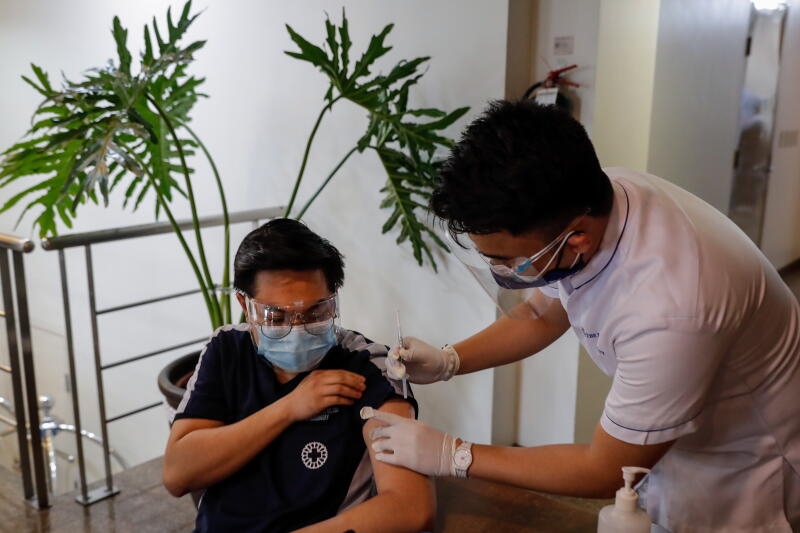Editorial Notes
Where is the vaccine?: Inquirer
The paper says that there is still no signed supply agreement of vaccines in the Philippines although a delivery date was boldly set at midmonth.
Sign up now: Get insights on Asia's fast-moving developments

A health worker receives a mock vaccine shot during a Covid-19 vaccination drill at the Medical City hospital in Ortigas City, Metro Manila, Philippines, on Feb 18 2021.
PHOTO: EPA-EFE
MANILA (PHILIPPINE DAILY INQUIRER/ASIA NEWS NETWORK) - A survey by the Department of the Interior and Local Government (DILG) found that only 3 of 10 Metro Manila residents want to be vaccinated against Covid-19.
It's a major problem given the DILG target of 80 per cent of the National Capital Region's population, and again underscores the need for a science-based drive to inform Filipinos of the urgency of fortifying themselves against the coronavirus, and of pulling together for the nation to achieve herd immunity.
The Inquirer health columnist, Dr Rafael Castillo, has provided a guide to help Filipinos make an informed choice.
The DILG has said it would continue making the rounds to push immunisation.
But its survey finding puts in context the results of yet another survey: that of the 10 members of the Association of Southeast Asian Nations, the people of the Philippines are the least satisfied in their government's response to the Covid-19 pandemic.
In "The State of Southeast Asia 2021" online poll taken by the Asean Studies Centre in Singapore from Nov 18, 2020, to Jan 10, 2021, Vietnam led citizen satisfaction with 96.6 per cent, followed by Brunei with 93.9 per cent, and Singapore with 92.4 percent.
Among Filipinos, 17.9 per cent "strongly disapproved," and 35.8 per cent "disapproved" of their government's response; only 6 per cent "strongly approved," and 19.4 per cent "approved" of it.
It's unfortunate that the government's talking heads wouldn't give the survey outcome the time of day.
An ally of President Duterte, Albay Rep Joey Salceda, also claimed that the poll was "not a scientific survey" and that its results did "not reflect the sentiment of the man and woman on the street."
He also panned a supposed attempt "to politicise something that isn't meant to be so," as though in reducing the numbers to mere PR, he didn't actually politicise the issue himself.
The Department of Health sensibly said it recognised "the sentiments expressed… and values the voice of the Filipinos." It also pointed out that the government's response to the pandemic "is only as good as the institutions (that) implement it, and the people who comply with it…" Quite right.
Per the survey results, Filipinos deemed Covid-19 their "most pressing concern," and 72.2 per cent said Mr. Duterte's administration must "encourage more scientists and medical doctors to contribute to public policy discussions and heed their advice."
For a year now, retired generals have been pushing the most important levers in the government's response.
While doubtless aware of the pandemic's disastrous effects, they must also know that the public they serve expects their life-and-death decisions to be grounded in science, and common sense.
Or, simply, compassion for the now doubly impoverished so as not to deepen the rift between privileged and powerless (as when, for example, Sen Koko Pimentel is found blameless in gadding about despite testing positive for Covid-19, while idled jeepney drivers get clamped in jail for seeking state attention to their penury).
Filipinos dismayed by incoherent policy statements issued by the Inter-Agency Task Force for the Management of Emerging Infectious Diseases would hardly be surprised by the survey's low approval numbers.
The announced-then-deferred reopening of cinemas and game arcades effective Feb 15 - a decision made in the face of prevailing quarantine conditions and rising Covid-19 cases, and without consulting local government heads - added to public bewilderment and anxiety.
To be sure, the economy badly needs a boost, but the public also needs reason, vision - and the swift disbursement of stimulus funds.
The fact is that Filipinos are not getting it straight from their leaders.
The single most significant question now concerns the vaccine, for which - after the ceremonial signing of papers as well as artful dry runs for airport arrivals and transport to cold storage, including possible interruptions that involved mock mass actions complete with placards- there is still no signed supply agreement as we write.
Yet a delivery date had been boldly set at midmonth!
With the admission of both vaccine czar Carlito Galvez Jr and Health Secretary Francisco Duque III that the enabling documents are yet nonexistent, what's holding things up?
Why exactly is the Philippines so bereft? Who's in charge? Even Bangladesh, financially strained for valiantly continuing to host the Muslim Rohingya who fled Myanmar, and the North African nation of Algeria have begun their vaccination rollouts.
And all the Palace can say is that the President has consented to be jabbed in public.
The Philippine Daily Inquirer is a member of The Straits Times media partner Asia News Network, an alliance of 23 news media organisations.


